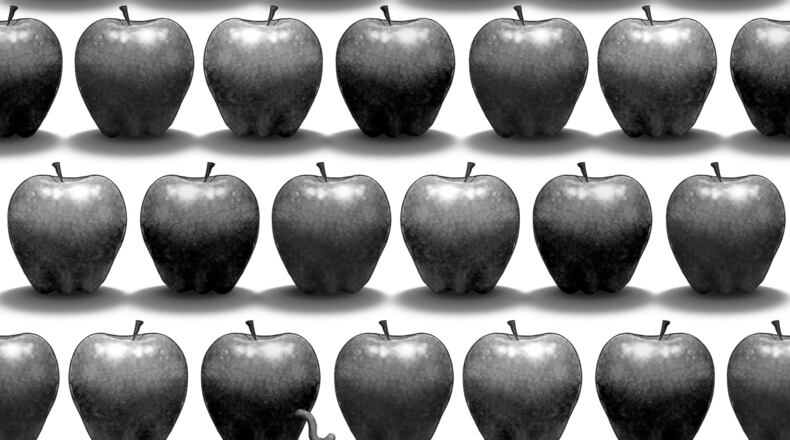Would you encourage your child to become a teacher?
When the state Department of Education asked 53,000 Georgia teachers, two out of three replied they were "unlikely" or "very unlikely" to recommend teaching as a profession to high school students. Only 2.7 percent said it was very likely they would encourage their students to go into teaching.
Let me suggest two reasons why: James Dickson and Lyn Orletsky.
Dickson was a well-respected high school French teacher suspended from DeKalb School of Arts because he inadvertently showed a short clip from an Academy Award-nominated animated French film that a parent found racially offensive. Orletsky was an acclaimed Cherokee math teacher swept up in a political squall after she asked two boys to turn their "Make America Great" T-shirts inside out because other students were disquieted.
During an August school lockdown in which students had to remain in his classroom after the bell, Dickson took a student’s suggestion and showed a clip of “The Triplets of Belleville,” which included cartoon burlesques of American-born French performer Josephine Baker’s banana skirt skit and hoofer Fred Astaire being eaten by his tap shoes.
The teacher apologized, telling the parent in an email: “I had seen the movie years ago and know it is considered a ‘classic,’ but I had forgotten about this aspect of it. I did stop the video before it was finished and will definitely not show it again…I apologize for this lapse in diligence.”
Keeping in mind that Common Sense Media, which rates movies for family viewing, pronounced "The Triplets of Belleville" appropriate for children 12 and older, I assumed DeKalb Schools would not upend a class over this. I was wrong.
“Mr. James Dickson, French teacher, has been reassigned to Rockbridge Elementary School,” said spokesman Andre Riley this week in response to my request for an update.
Now, Dickson's former students have a long-term substitute while the district advertises: "DeKalb School of the Arts is seeking a French Teacher who utilizes best practices to increase student achievement."
Good luck with that. According to a report this year by the American Academy of Arts & Sciences, more states report a teacher shortage in languages than in any other subject.
Then, we go north for the next teacher overboard story. Lyn Orletsky was that rarest of educators, a National Board Certified teacher, which is a distinction held by less than 3 percent of teachers nationwide. In Florida, she was a finalist for the Presidential Award for Excellence in Mathematics and Science Teaching. She was an effective teacher, especially for high-achieving math students.
But Ortletsky made a mistake: When students in her River Ridge pre-calculus class challenged two boys wearing Trump “Make America Great Again” T-shirts, the teacher attempted to deflect the disruption by asking the boys to turn their shirts inside out. When they asked why, she said the slogan had been co-opted by white supremacists as a result of Charlottesville. The exchange, captured on cellphone video and released to a conservative website, led to email threats on her life and a GOP candidate for Georgia governor picketing her school.
Orletsky had no history of bringing politics into her math classroom. She was suspended and a note went to parents stating: “Ms. Orletsky no longer is your child’s math teacher, effective immediately. We have assigned a substitute teacher and are searching for a knowledgeable and experienced educator to teach these classes for the rest of the school year.”
(Finding a math teacher who can teach AP is not easy. According to the U.S. Department of Education, there is a national shortage of math teachers.)
Last week, Orletsky resigned, saying, “After attacks on my character and threats on my life, I have made the decision to resign from my teaching position at River Ridge High School. While in hindsight I would have handled the situation differently, the outcry over this incident has been disproportionate to the event itself.”
Those applauding her resignation aren’t the parents of serious math students who suffered a gap in instruction that could undermine their performance on the AP exam. Research shows teaching disruptions hurt student achievement. A Duke study found that being taught by a substitute teacher for 10 days per year had a larger effect on children’s math scores than if they changed schools.
In both of these cases, teachers were sacrificed to political agendas and pressures. And so was student achievement, which is supposed to be the top priority of districts.
About the Author
Keep Reading
The Latest
Featured




